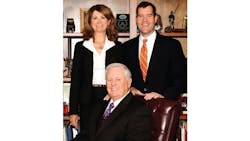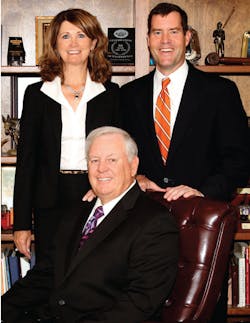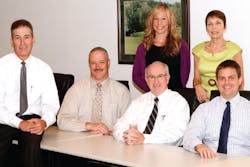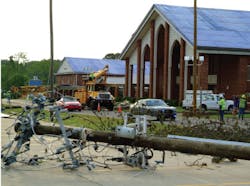From the moment you walk up the steps of the Tri-State Utility Products Inc., headquarters building in a quiet industrial park in Marietta, Ga., on the north side of Atlanta, you quickly realize it’s a different type of distributorship. When you go through the door, there isn’t a Plexiglas divider between you and the receptionist. You are greeted by Judy Williams-Donlevey with a friendly, “Hi, May I help you?” in the reception area. Judy sets the tone at Tri-State Utility, greeting all visitors and answering incoming phones. There’s no voice mail at Tri-State Utility because Wade Patterson, chairman; Debbie Patterson, the company’s executive vice president and owner; and Rusty Batch, CEO; don’t want customers getting lost in the voice mail labyrinth. It’s a part of the personal touch that many companies talk about but relatively few can really pull off.
The walls of the reception area and offices are covered with Wade’s landscape photography and feature some of the beautiful areas in the United States that he and Debbie have visited during their many fishing and golfing excursions around the country. They grew up on farms in the western North Carolina’s Blue Ridge Mountains and love the outdoors. In one corner of the reception area are photos from the retreats Tri-State holds annually for employees and their families — one day of meetings for the employees and one day of family fun for everyone. Another differentiator for Tri-State becomes quickly apparent at the Marietta office — no casual dress. It’s suits and ties for men, whether they are working in the office or out in the field calling on customers.
Tri-State Utility is not exactly a small business — with $86.2 million in 2012 sales, over 30 employees and three locations, the company ranks #89 on EW’s 2013 listing of the Top 200 distributors. The company was also ranked #2 in sales-per-employee this past year. But the Pattersons run it like a small company. They have created a corporate culture where all employees have each other’s backs, helping out on sales calls, each with their own distinct expertise in the utility market. And when a hurricane, tornado or blizzard knocks out power in their service area of Georgia, Florida, Alabama and a bit of western North Carolina, they all come in on weekends and stay late at night to prepare and deliver orders for their utility customers, which include large and small electric cooperatives, municipal utilities, and several investor-owned utilities (IOUs), including Georgia Power, Alabama Power, Gulf Power and Mississippi Power (all part of Southern Co.).
“We celebrate together and we cry together,” says Wade Patterson, who gets a little emotional when he thinks about how things have come together for Tri-State Utility and Supply over his 36 years with the company. He began this journey working for a small municipal utility before moving to the supply side of the industry in 1975 and ultimately landing a job with Tri-State in 1977. When you first meet Wade, with his soft western North Carolina drawl and laugh-out-loud-funny sayings and stories (most totally original, some borrowed) he is very entertaining company. You don’t meet many people in the electrical market who can weave in “from cabbages to kings” when discussing his company’s line card or array of services, or who once said an employee’s eyes were redder than a fox’s you-know-what during pokeberry season.
After hearing some of his stories, you might think for a moment that Wade doesn’t take life too seriously. But the more you visit with him, the more you realize you are talking with a dead-serious dude who has a buttoned-down strategic plan for his business and an appreciation for what life has given him. He is a devout Baptist who is proud to run the company as a faith-based business, and he, Debbie, and Rusty Batch, who is part of the company’s succession plan, like to give thanks in prayer before any business meal. Wade also says the company’s logo, which shows a triangle outlined in black and partially filled in with blue, is designed to show that while he and his employees will never be perfect in this life, they are always striving to learn more and service their customers better. And when confronted with a sticky business situation, Wade says the company’s employees know that the only way to handle it is morally and ethically.
From rep to distributor
Tri-State’s unique approach to servicing utilities can be traced back to its roots as an exclusive agent for Allis-Chalmers (now Siemens), when the company was founded in 1956. Tri-State’s logo is based on the Allis-Chalmers’ logo, and today, 57 years later (the longest continuous agent contract that Siemens has), the company still stocks Siemens utility products. Back in the early days, the company took full advantage of the founder’s engineering skills, and designed and built substations. They also sold all of the products that went into them, including circuit breakers and regulators. In the more rural areas of the company’s marketplace, there weren’t many engineers, so providing that capability was a valuable service to offer.
But in the mid-1970s, Wade and the company’s other owners made a major decision that shaped how Tri-State Utility does business today. “We got our heads together and realized the market was changing,” he says. “Even though we had a great history building substations, more places had engineers to do the things we’d been doing. We decided to shift and get into a blend of agent and distributor. We didn’t distribute anything before 1977.”
The exclusivity that came with being a rep for Allis-Chalmers is a big part of Tri-State’s business strategy today, because whenever possible the company likes to have a single-line, exclusive partnership with a manufacturer. Patterson says its exclusive relationship with Allis-Chalmers and taking on the Howard Industries line in a combination agent-distributor exclusive arrangement are the “cornerstones” of the company’s strategy of using exclusive distribution agreements to make a difference in the market. Tri-State now has exclusive arrangements in place with Hubbell Power Systems; Howard Industries; Landis & Gyr; Southwire; Locweld, Fort Worth Tower, Nordic Fiberglass, Tech Products, 3M, Crosslink Technology, Hoppecke, Probe-Tec, Transtel Group, Ripley Lighting, Holm Industries, OCAS, Kyocera, Connector Manufacturing Co., and thermOweld. The company also carries utility products from 18 other manufacturers in non-exclusive arrangements.
Explains Wade Patterson, “Unlike everyone else that claims to be a distributor, we line up as an exclusive with a manufacturer. That has been a difference maker. The single biggest one we have ever done has been Hubbell Power Systems. That deal was created in 1998. It’s 15-years-old now. When we recruit a new line, we try to form a partnership with the manufacturer. That’s radically different and sets us way apart from everyone else.”
Rusty Batch says when Wade started recruiting him from his job as a sales executive at Southwire managing the manufacturer’s West Coast utility sales to be part of Tri-State’s succession plan back in 2008, he was really intrigued with the concept of Tri-State being an exclusive distributor for so many lines. “I would not work well in a distributor that didn’t have that exclusivity,” he says.
Rusty says he knew Wade and Debbie Patterson from attending many of the same utility industry meetings, including the North American Association of Utility Distributors (NAAUD), but he was still surprised to get a call one day from Wade and hear him ask, “How’s your fishing going? You and I really need to get out fishing.” Batch already knew of Tri-State’s stellar reputation in the utility marketplace, and he was intrigued by how the company went to market. “The challenge of all Tri-State did was certainly interesting to me,” he says. “It’s meters, transformers, regulators, pole-line hardware, tapes, splices, and being involved with every piece of the transmission and distribution grid. My experience had just been wire and cable. That made it interesting and challenging.”
Where the rubber meets the road
While sales from reconstruction efforts in the aftermath of storms don’t account for as a high a percentage of Tri-State Utility’s revenues as do sales from the construction, expansion and maintenance of utilities’ power systems, Batch says how a utility distributor responds to customers’ needs during a storm can make or break its reputation. Over the years, Tri-State has responded to all sorts of major and minor power outages, but in recent years none put the company to the test more than the tornados that decimated a 200-mile long swath of Alabama in 2011 (see sidebar on page 26) and what Georgians like to call “The Storm of the Century,” the 1993 blizzard that dumped more than 20 inches of snow on the Atlanta metroplex and outlying areas.
Everyone at Tri-State has their favorite storm story. Wade like to tell the tale of driving an old Ford Bronco into the northern Georgia mountains to help out Blue Ridge Mountain EMC during the Storm of the Century. The Bronco was loaded with automatic sleeves and other utility supplies, but as the storm intensified he had to find a place to drop them off and get back to the office because he couldn’t quite make it to the customer. He pulled into a store and asked the owner if he could keep the supplies there until the storm passed. When the store owner said he couldn’t do it, Wade told a bit of a tall tale, and said that if he would let him keep the supplies there until after the storm blew through, he would see what he could do about getting the power on for his store before other areas that were down. The utility was apparently at first none too happy that Wade had kinda-sorta promised to get the store owner power, but in the end the customer was pleased with Tri-State’s service during that storm, and today Wade proudly displays a plaque from Blue Ridge Mountain EMC lauding Tri-State for that service.
Debbie Patterson likes to tell the story of how the company responded to a big hurricane that knocked out power in Florida a few years back. “Tim Martinloaded up in the driving rain and got down to Tallahassee. The business manager there said, ‘Tim is here. We have him loaded and we are sending him to central Florida. I said, ‘No you are not. He has to have some rest. Send him out first light in the morning.’” Says Tim about that memorable delivery run, “The roads were underwater. I called and said, ‘We have a problem. I am trying to get there but we have some cows floating across the road in the water.’”
“We are committed to emergency relief,” says Wade Patterson. “It’s one of the secrets to what makes us go. When a storm comes, we work 24/7 until it passes. The horrible storms that came through Alabama, we were recognized as one of the major suppliers that helped them through that. The Alabama office has a shelf full of trophies relative to that. We have done it here in this office many times, and in Florida many times. In Florida we are in the hurricane belt. Storm restoration is really, really important to us. All employees know that if a storm comes, you are expected to be here, and you are expected to be here all day and all night if you need to be. When I look back to how we first began our relationship with Alabama Power Co., when they had some really nasty storms in the 1990s. We responded to their emergency needs and that allowed us to grow with them on the day-to-day business.”
Wade says Tri-State must be able to provide stellar service during storm season, as well as the rest of the year, because there just aren’t that many utilities out there and the company can’t afford to not service them to the hilt. To do that, the company has two inside salespeople and one field salesperson on every account so there won’t be a breakdown in service. This includes Wade and Rusty, who have account responsibility with major customers.
“I can’t get a new customer,” Patterson says. “A commercial-and-industrial distributor can have someone walk in off the street 20 times a day. We have a finite, fixed set of customers. Our service must be above and beyond what anyone else will do. We have to be knowledgeable with our products. We spend a lot of time training and teaching in here. If the customer knows you know what you are talking about, he will trade with you. Conversely, if he senses you don’t know technical products, he will trade with someone else.”
Adds Batch, “Wade does a lot of the technical training on a monthly basis. He is without qualification one of the smartest people I have ever met. Very technically competent, yet he can take the technology and make it simple to understand. A manufacturer once told him, ‘Wade, you really need to hire someone who specializes in our product. Wade said, ‘We have. It’s me. I am your guy to do that.’”
When asked if a new competitor in the Atlanta market could start up a utility specialist using a business strategy similar to Tri-State’s, Wade Patterson says he doesn’t think so because of the consolidation on both the manufacturer and distributor side of the utility market.
“Let’s go back 20 years — there were as many as 10 independent distributors in Georgia,” he says. “Now there are only four players in Georgia — Gresco Utility Supply, Forsyth, Ga.; Tri-State; Irby (Sonepar); and HD Supply. When you look at the size of Sonepar, HD Supply and Gresco, it literally is David versus Goliath. But our people are so well-prepared and so well-trained, that’s the difference maker.”
On the manufacturing side, he says consolidation has whittled the market down to really big players that manufacture broad and deep utility product lines. MacLean Manufacturing and Hubbell. are the best examples of that consolidation. There’s still a mix of companies that specialize in various types of utility products. Wade knows them all and in many cases knows the major players personally.
You have to have the right products, the right people,” he says. “And you have to have the commitment.”
Looking back at his years with Tri-State, Wade says he loves teaching employees, working with customers and vendors who in many cases have become personal friends, and the networking opportunities he has gotten through the NAAUD utility association and manufacturers’ distributor advisory councils. Wade has served in a variety of executive posts for NAAUD over the years and this year Batch is the association’s president.
“We joined NAAUD in 1990,” Patterson says. “It gave us national exposure and allowed us to benchmark ourselves against other distributors around the country. We also joined distributor advisory councils. If I had to point to one thing that stretched us the most it was that — finding out what other distributors know that we don’t know, and what we know that they don’t know. We went from a mom-and-pop Georgia company to expanding to a Southeast footprint. As we got involved with these councils, it made us better because we could see the big picture.”
Patterson still loves learning about new products and technologies and says the automatic metering equipment that’s such a big part of the smart grid plays a big role on load studies and outage management. He believes other products like solar generation and LED fixtures are still in the early stages of their adoption by utilities.
“The smart meter is the real deal,” he says. “When Alabama had those bad storms, Alabama Power Co. could track it with all those smart meters. They could see exactly who was out.”
Patterson has a pretty simple formula for enjoying his job so much. “I myself am never satisfied where I am,” he says. “I am always searching for more knowledge every day. I have an order sitting on my desk the last two or three days that I am working on like I was a rookie salesperson. I love teaching employees. I love growing this business. We will never be perfect but we are always trying to color in that triangle. The whole thing boils down to serving the customer. If you outserve the customer, you win.”
Being There When It Counts
Tri-State Utility Products has helped its utility customers through dozens of storms over its 57-year history. But the tornados that devastated a huge part of Alabama in April 2011 may best illustrate just how much service the company must provide in a disaster situation. Here’s what Rusty Batch remembers about the company’s response:
“April 27, 2011. It was a Wednesday when the storm hit. We were watching the news like everyone else, but we didn’t quite understand the devastation. Typically, tornados are very local. We have responded those. A tornado plops down in an area and then it leaves. These tornadoes were different. One large one stayed on the ground for miles.
“Alabama Power called Wade. And the reason they called him is that after 35 years in this business, he has an unmatched awareness of what the problems are going to be and how to solve them. And he has creative ways of doing that. They said, ‘Wade, we are in the ditch. We need some help.’ Their specific need was for transformers. Our relationship with Alabama Power is that we don’t sell them transformers. We don’t have an open contract. Typically, the large IOUs (investor-owned utilities) will buy those kinds of materials direct. But they knew we had a lot of capability. Wade said, ‘Let me see what I can do.’
“He started calling around to other utilities. Within a couple of days, we were delivering flatbed trailer loads of transformers. And we didn’t buy a single one of them from a manufacturer. We assembled them from area cooperatives. We were buying transformers from our customers. Some were spares, some were working units recently taken out of service because of conversion upgrades. We supplied a significant number of the transformers that Alabama Power used during that storm, along with other products.
“Our guys in our office in Pell City, Ala., worked around the clock taking orders, expediting material from manufacturers. We shipped some products from our Tallahasee warehouse and out of Marietta. Everybody becomes a delivery person. Every delivery vehicle becomes a delivery vehicle. Nobody in this industry besides a guy like Wade Patterson can pull together that kind of response in a storm. It’s a really unique capability.”
Mike Martin and Charles Marshall, who work out of the Pell City branch, said the tornado was on the ground for 208 miles, and cleared a path from 1 mile-to-1.5 mile wide. Said Martin, “It was the worst damage Alabama Power ever experienced. It was unreal. We worked about two straight weeks sourcing material. Added Marshall, “We treated it like any other storm but it was not like any other storm. We were in constant contact with the factory. It was a total team effort.” They said they would call Alabama Power each night and on weekends to make sure they had what they needed, and basically asked them permission to go home and get a little sleep. Martin and Marshall were publicly recognized at a gala event for their efforts by Alabama Power in helping the utility restore its electrical grid.
About the Author
Jim Lucy
Editor-in-Chief of Electrical Wholesaling and Electrical Marketing
Jim Lucy has been wandering through the electrical market for more than 40 years, most of the time as an editor for Electrical Wholesaling and Electrical Marketing newsletter, and as a contributing writer for EC&M magazine During that time he and the editorial team for the publications have won numerous national awards for their coverage of the electrical business. He showed an early interest in electricity, when as a youth he had an idea for a hot dog cooker. Unfortunately, the first crude prototype malfunctioned and the arc nearly blew him out of his parents' basement.
Before becoming an editor for Electrical Wholesaling and Electrical Marketing, he earned a BA degree in journalism and a MA in communications from Glassboro State College, Glassboro, NJ., which is formerly best known as the site of the 1967 summit meeting between President Lyndon Johnson and Russian Premier Aleksei Nikolayevich Kosygin, and now best known as the New Jersey state college that changed its name in 1992 to Rowan University because of a generous $100 million donation by N.J. zillionaire industrialist Henry Rowan. Jim is a Brooklyn-born Jersey Guy happily transplanted with his wife and three sons in the fertile plains of Kansas for the past 30 years.




